What you can do now to improve sleep later
Not sleeping is the worst, and there can be plenty of reasons why you can’t drift off including sleep disorders (besides sleep apnea). According to the Cleveland Clinic, sleep disorders are very common, affecting up to 70 million Americans every year. If you’ve already tried doing some stretches before bed to help sleep better, limiting your caffeine, and sipping on chamomile tea to no avail you might want to work on getting better slumber from the moment you wake up. Here’s what you can do today for sounder sleep tonight.
Get The Healthy @Reader’s Digest newsletter
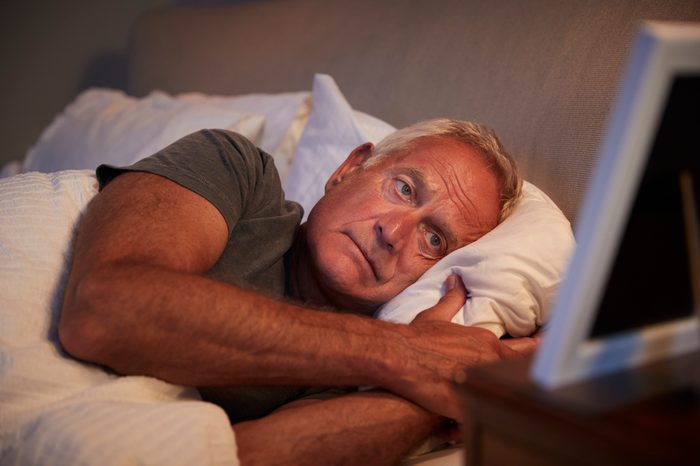
Try some reverse psychology
If you want to fall asleep faster, think about staying awake. “It sounds counter-intuitive, but for those who find it difficult to sleep because they keep worrying about not falling asleep, do the opposite,” says Sujay Kansagra, MD, director of Duke University’s Sleep Medicine program and Mattress Firm’s sleep health consultant. Most of the time falling asleep is an involuntary process that takes virtually no effort on our part but if we’re anxious, we do things like looking at the clock and calculating how little sleep we’re going to get, which then causes sleep performance anxiety. “Instead of worrying about falling asleep, think about staying awake instead. This often lessens anxiety and gives your mind a chance to relax enough to fall asleep. It’s a technique known as paradoxical intent, a cognitive behavioral therapy technique used to lessen the anxiety around falling asleep.
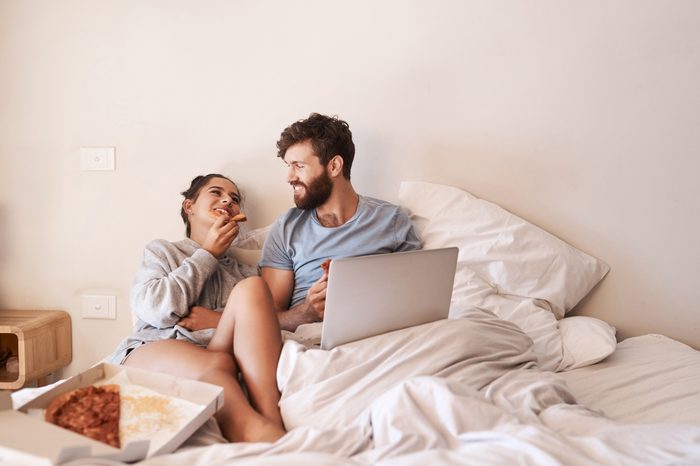
Stop snacking in bed
Noshing in bed is not great for catching your eight hours. “Eating in the bedroom, especially right before bedtime, can be very disruptive to sleep,” says Robert I. Danoff, DO, family physician and program director, Aria Health System. Salt-filled snacks could make you thirsty, drinking too much fluid prior to bedtime may cause extra trips to the bathroom and any caffeine within four hours of sleep may keep you awake or cause disrupted sleep. Caffeine can also make you feel anxious and jittery. Eating before bed is also one of the many nighttime habits that can lead to weight gain.
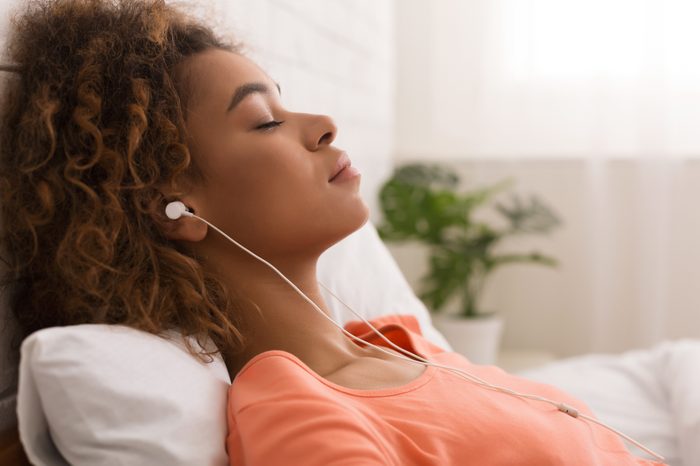
Listen to these grown-up lullabies
Even if our parents couldn’t carry a tune, a lullaby was a soothing way to get us to sleep. They knew then what science has found: that certain kinds of music can improve the quality of your sleep. Research published in 2019 in Scientific Reports found that relaxing music improves sleep quality. They also found that those who listened to music transitioned from wake to sleep more quickly. Other research has found that music may even benefit people with insomnia.
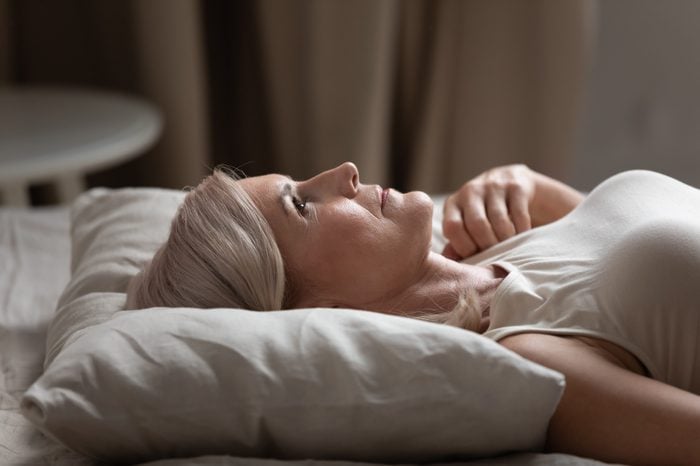
Put it in neutral
Ever watch a dog before he lays down to sleep? He circles for a bit, lands, adjusts his position a few times and finally heads to snooze town. He must know what his neutral position is. “Just as important as the quantity of sleep is the quality of sleep, and a large aspect of this is posture,” says Param Dedhia, MD director of Sleep Medicine at Canyon Ranch in Tucson, Arizona. “A neutral spine can be on the back and it can be on the side. The positioning with pillows is key. When our body is neutral with an aligned spine, it allows our musculoskeletal and neurological system to be with less twisting, pushing and pulling. Neck, shoulder, low back and hip pain are less aggravated with a neutral spine,” says Dr. Dedhia. Even when you shift positions in the night, you can still maintain a neutral position by using your pillow to readjust and align the spine to be comfier.
Here’s the Best Position to Sleep in If You Snore, Says a Sleep Doctor

Talk to your doctor about magnesium
If you want to improve your sleep tonight, you may want to consider a magnesium boost. A magnesium deficiency can contribute to insomnia and other health problems. The recommended daily intake for magnesium for adults ranges from 310 mg to 420 mg, depending on sex and age. Talk to your doctor about whether a supplement is right for you.
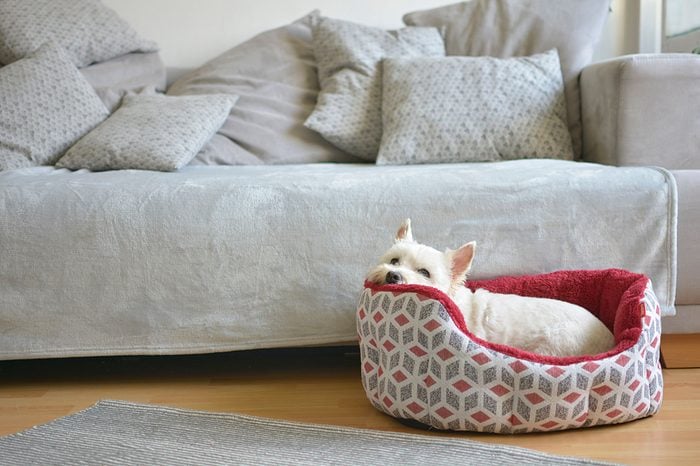
Kick your pooch out of bed
If you’re having trouble sleeping and have checked off the common culprits, the answer could be co-sleeping with your furry friend. “The movements and breathing of a pet may be somewhat distracting and disrupt falling back to sleep,” says Mark Buchfuhrer, MD, medical director of the Comprehensive Sleep Center at Good Samaritan Hospital in Los Angeles. “In addition, patients with allergies to pets may have increased allergic symptoms such as the runny nose or nasal congestion that may interfere with sleep.”
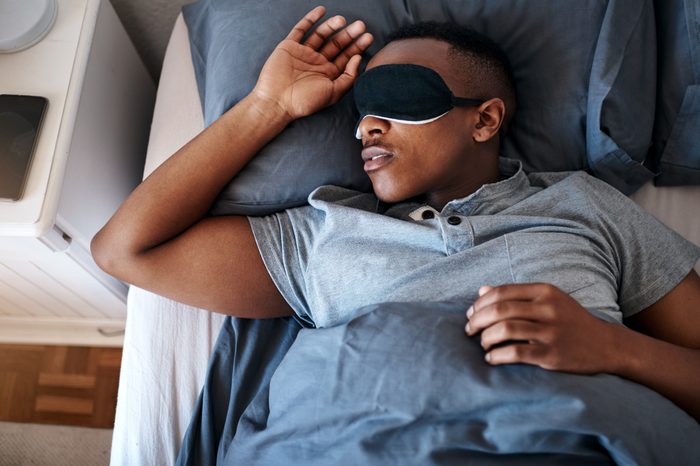
Go for the earplugs or sleeping mask
Making your bedroom the ultimate sleep oasis isn’t too difficult with a few simple tips. Dr. Buchfuhrer has a nifty checklist to make it happen: Random noises can interrupt light sleepers. Earplugs or white noise from a fan can help keep a constant hum going. We’ve all heard by now about how “blue light” from our devices, TV’s and other electronics can mess with melatonin production, a sleep hormone. “Avoid watching LCD TV or computer screens for a few hours before bedtime as they emit higher frequencies of light similar to daylight.” Dr. Buchfuhrer suggests downloading FLUX to adjust your computer screen to emit light that is appropriate for the time of day. Blackout curtains and sleeping masks are essential if you suspect your suspect light is keeping your awake. You may even want to switch out your bulbs tonight. Regular bulbs suppress melatonin but these bulbs filter out the “blue light,” which could help you fall asleep faster.
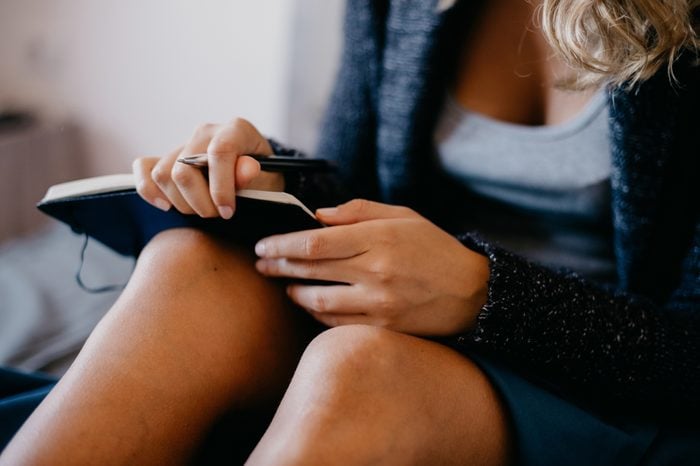
Write it out
Your head finally hits the pillow and you let out a soft yawn before you drift off—until you remember all the things you have to do tomorrow. If you want to fall asleep faster tonight, try Dr. Kansagra’s suggestion and create a list of tasks, worries, chores, or whatever is keeping your awake. This technique is ideal for those who mentally work through their list of pending responsibilities before bed. “You can prevent yourself from thinking about it excessively just before bed,” says Dr. Kansagra. This strategy works best if you do it more than an hour before bed, otherwise, the task may be too stimulating.
For more wellness updates, follow The Healthy on Facebook, Instagram, and Twitter. Keep reading:


